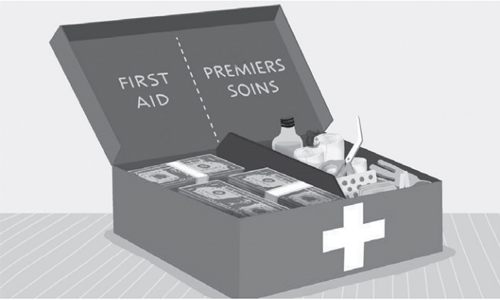What a French doctor’s office taught me about health care?
A dozen of us sit expectantly in the orthopaedic surgeon’s waiting room. We’re here for follow-ups. Some, like me, have had bunions removed. Others have had hips or knees replaced. Most are older women. The copies of Paris Match and Le Monde on the table are at least six months old. The only artwork is a framed print of Claude Monet’s “Poppy Fields Near Argenteuil.” Since I’m only two weeks out from surgery and can’t drive, I came by taxi.
The fare was underwritten by the French social security system, known familiarly as la Sécu, which also provides health insurance for all residents. The woman seated opposite me tells me she’s on her second bunion surgery. Her doctor, a top orthopaedic surgeon, charges more than the normal Sécu compensation, as do many specialists. Most French people purchase a supplementary insurance plan to cover costs not picked up by la Sécu. As a French resident and taxpayer, I have one too. Another woman is recovering from a hip replacement. Medical chat is common in French waiting rooms. If the wait is long, everyone comes to know everything about one another’s complaints. To my friends in the United States, this casual attitude seems foolish, even risky.
But in France, medical privacy is irrelevant. No one will lose her job because of a lengthy convalescence. There is no possibility that pre-existing conditions will make insurance unaffordable. Unemployed people still receive treatment. Huge medical bills do not reduce ordinary citizens to a state of existential terror. The absence of unease over health care alters the texture of French experience. We get cozy in waiting rooms. A woman in her late 60s sits next to me. She fidgets and appears close to tears. She leans over and asks in a low voice how long it has been since my surgery. She’s wearing the orthopaedic boot, but unlike the rest of us bunion ladies, she’s still using crutches. She tells me she had surgery four weeks ago and believes something is wrong.
The woman across from me leans forward. “Que s’est-il passé?” What happened? My neighbour describes a “sensation de craquement” — the feeling that the bones in her foot are crunching when she puts weight on it. Three other women reassure her: The bone crunching is normal. Those bones had to be broken and realigned to reshape her foot. Yes, but the physical therapist told her that the doctor had botched something. Now she’s frightened. The therapist was completely wrong, we tell her. She seems relieved, but grows worried again when she realises she should have restarted physical therapy sessions a month ago. Then the doctor appears and calls the woman’s name. Even rock-star orthopedists here don’t have nurses helping them in their offices.
The doctor changes his own examining table paper. His staff consists of two foul-tempered office assistants who make appointments, take payments and hand out prescriptions. The woman picks up her crutches. He raises his hands in question. The crutches? Still? She fights back tears. We reassure her it will be fine. She limps after him into the examining room, dragging the crutches in one hand. I am an accidental European. I developed breast cancer in 2009. With no continuing medical coverage in the United States, and in desperate need of it, I moved to Britain. Under the sponsorship of an acquaintance, I was granted “indefinite leave to remain” and received care through the National Health Service. When I moved to France four years ago, the French system quickly took over covering me.
It has taken me nine years to grow accustomed to the idea that my health care won’t suddenly evaporate at the whim of a new government. Doctors here often ask how I landed in Europe. When I tell them, they shake their heads. American values are deranged, they say. Sometimes I encounter Americans for whom visiting France is like a trip to Disneyland, only with foie gras, and they’ll ask about medical care. One such visitor, on learning I have a “carte vitale,” a social security card, asked, “How did you score that?” as if health insurance was like box seats at a Yankees-Red Sox game. I don’t live in the promotional brochure version ofFrance those Americans are touring.
France for me was not a vacation selection. Moving to Europe was a choice weighed against other, grimmer options for health care, which included the strong possibility of being bankrupted by cancer treatment and winding up at the mercy of New York state’s welfare system. In France I can rest assured I will not be refused care for any treatable condition, including a painful bunion — or yes, even a recurrence of breast cancer. All the same, I’d rather have been able to get coverage without emigrating. Too many Americans do not realise how much better off they would be if they felt safer about access to medical care. Imagine what might happen if everyone felt safe — safe enough to talk about ailments in waiting rooms.
Related Posts

